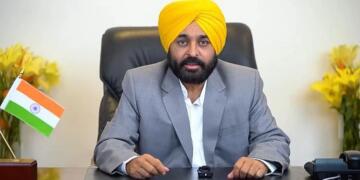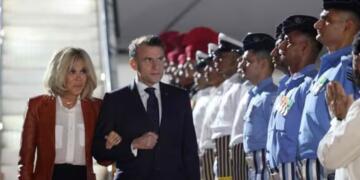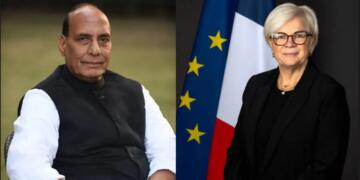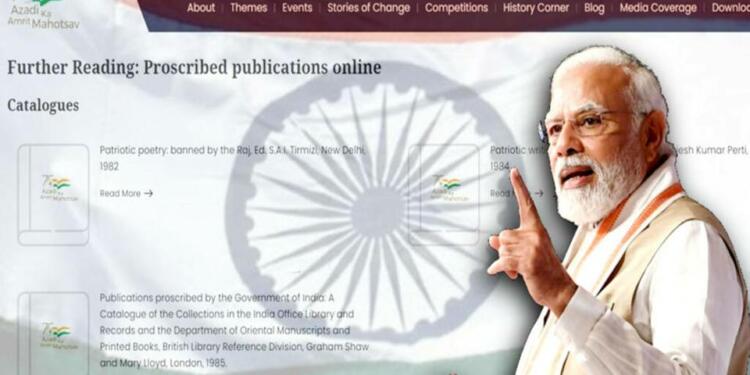What according to you is the most valued thing in the world? While many of you may start thinking about it, in a mere materialistic sense, the answer to that is FREEDOM. Every Indian soul, led by visionary freedom fighters and revolutionaries, fought against the British to break the shackles of Imperialism.
At that time, writers, historians, freedom fighters and poets poured their heart out on paper, inked heart wrenching and conscience shaking poems to infuse the sense of patriotism and give clarion calls to strive for India’s independence.
Unfortunately, the British Raj tried every trick possible in their books to crush this struggle for Independence. They banned, wiped out all traces of such patriotic poetries and jailed awakened souls. Thankfully the Modi government has taken on the task to revive the greatest literary works banned by the Colonial power.
Truth suppressed for far too long
The Modi government is known for correcting many historic wrongs. In a similar move, it has decided to revive the revolutionary poetries banned by the British Raj. The Ministry of Culture, the nodal Ministry responsible for the 75-week-long Azadi ka Amrit Mahotsav, has dedicated a section of its website called Swatantra Swar for the same. The section showcases some of these poems written before 1947, in languages such as Hindi, Bengali, Gujarati, Kannada, Marathi, Odia, Punjabi, Sindhi, Tamil, Telugu and Urdu.
To crush India’s freedom struggle, the British government had banned a body of literature terming these writings as ‘dangerous’ to the ‘security’ of their rule in India. These revolutionary works were aimed at arousing patriotic feelings in the minds of the people and invoking them to rise up for India’s independence. The same artwork has been revived by the Ministry and has been made available in various Indian languages, such as Hindi, Bengali, Gujarati, Kannada, Marathi, Odia, Punjabi, Sindhi, Tamil, Telugu and Urdu.
To popularise the proscribed publications, these have been recited by many prominent personalities including nine Ministers of the Modi government.
Ministers, eminent personalities to popularise these revolutionary work
Union Information and Broadcasting Minister Anurag Singh Thakur recited Hindi poem “Rashtriya Pataka” from the book “Azaadi ki Bansuri”.
Culture Minister G Kishan Reddy can be seen reciting Telugu poem “Bharatha Matha Geetham” by Vaddadhi Seetharaamanjaneyulu and Pudipeddi Kashi Viswanatha Sashtri.
Also Read: The story of India’s independence – Chapter 6: The final push that made the British quit India
Education Minister Dharmendra Pradhan recites “Daridra Nian” by Odia poet Gangadhar Mishra. Health Minister Mansukh Mandaviya recites Gujarati poem “Kasumbi No Rang ” from the book Sindhudo by poet Jhaverchand Meghani.
The Website also includes catalogue for many other proscribed publications banned by the British to continue their oppressive regime.
Culture Secretary Govind Mohan apprised about the efforts made by the government for celebrating the 75th year of Indian Independence. He said, “In the 66 weeks of Azadi Ka Amrit Mahotsav, more than 47,000 programmes have been organised — from commemorating unsung heroes of freedom struggle to documenting local history, from spotlighting states and their contribution to the freedom struggle to poetry based on banned literature.”
While celebrating the most valuable thing, that is, FREEDOM, we should be grateful for the great souls that endured many atrocities and yet remained determined for India’s freedom. Thankfully because of those untiring struggles for India’s independence, truth attained FREEDOM and we are fortunate enough to hear, read and re-echo those memorable poems. It is good to see that the Modi government is bestowing the honour to these great artworks which they deserve.
Support TFI:
Support us to strengthen the ‘Right’ ideology of cultural nationalism by purchasing the best quality garments from TFI-STORE.COM




























